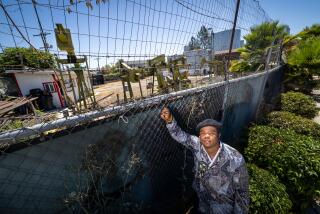Environment Becomes Burning Issue in Kuwait : Mideast: A team of university scientists takes an activist role in assessing the unprecedented damage done to the country.
- Share via
KUWAIT CITY — The first home-grown environmental activist group in Kuwait--a nation plagued by oil spills, blazing oil wells and polluted skies--has set up shop. But already the group could be headed for controversy.
Founded at the end of March by a department head at Kuwait University and 16 scientific colleagues, the Kuwait Environmental Action Team has stepped in to offer ecological information it believes is not being made available through the Kuwaiti government’s own environmental agency.
The new activists have also begun their own studies--in cooperation with Earth Trust, a Honolulu-based environmental group--of the unprecedented environmental damage done to their country during the Iraqi occupation.
“They are the cream of the people who can deal with environmental work in Kuwait. And they are enthusiastic and active,” said Peter Literathy, an environmental chemist who supervised several of the scientists in a decade of work at the Kuwait Institute for Scientific Research. Literathy now heads the U.N. Environment Program project to measure and propose remedies for environmental damage in the Persian Gulf.
The new group’s first concern is explaining what little is already known about the massive pollution to journalists, visiting scientists from the United Nations and other agencies and to the Kuwaitis themselves--particularly those living near the smoke-belching oil fields.
“We felt that no one was really taking those people into consideration,” said Jassim Hassan, who organized the group. He is chairman of the university’s biochemistry department.
In a nation not previously noted for environmental concerns, Hassan began to worry when he learned in late October that the Iraqis, who had invaded the emirate in August, were placing mines and booby-traps in Kuwait’s oil fields.
“We knew something was cooking,” he said. Hassan and some friends had been making casual reconnaissance of Iraqi activities and gun emplacements since the invasion.
Then, from a braggart senior Iraqi army officer, they learned that orders had already been given not only to set fire to the wells but to destroy electrical power generators, desalination plants, telephone stations and other facilities before any retreat.
The morning after Iraqi troops left Kuwait city in February, Hassan made his first, stunned inspection of the burning wells.
“There was a lot of danger,” he said, “and people didn’t know what was happening. A lot of people were suffering in the dark, without water.”
Without phones, he began going house to house among his colleagues from Kuwait University and the Kuwait Institute for Scientific Research, the two main research centers in the country, neither of which is functioning now. By the end of March, he had persuaded the government’s Ministry of Information to pay for an office in the press center at the Kuwait International Hotel and had gained the blessing of the government’s Environmental Protection Council.
About the same time, Earth Trust arrived to share the office and some of the duties.
The going has not been easy.
“We’re using our own money at the moment,” said Hassan Nasrallah, a climatologist who spent 15 years as a student and researcher in the United States, only to return to Kuwait just two months before the Aug. 2 invasion.
The scientists have also donated their own office equipment, and they buy their own gasoline whenever they take visitors to see the damage.
These days, Kuwait is extraordinarily dangerous terrain in which to conduct tours and research. Last week, two British journalists and at least three Indian oil field workers died in a fiery accident or series of accidents at one of the oil pools.
Hassan and four other scientists found themselves tiptoeing through an uncleared minefield in the blazing Al Subia oil field several weeks ago.
The Earth Trust activists also say they have had several near-misses with mines and booby-traps, including one found under a pile of papers in the wrecked offices of the Kuwait Institute for Scientific Research.
Meanwhile, their efforts are hobbled by a lack of air-quality monitors and laboratory equipment, most of which was stripped from the country by the departing Iraqis.
“All of our instruments have been looted,” said Sami Yakoob, an environmental health scientist at the Institute for Scientific Research, who was the second to join the group.
A current project, however, taps the enthusiasm of a growing number of teen-age supporters.
Led by the scientists, the young volunteers have been surveying neighborhood residents in areas surrounded by the burning wells. They have been asking opinions on issues ranging from the quality of the air and water to the responsiveness of government.
The group plans to make a non-public presentation of the more sensitive survey results directly to the government. But some of this isn’t likely to be news the government wants to hear.
First, tabulations from the more than 1,000 interviews so far suggest that as many as half the Kuwaitis and Palestinians who live in the neighborhoods closest to the fires say they have health problems and that most think they should be evacuated until the wells are capped. About 500 wells are still burning.
This finding could collide with the Kuwaiti government’s encouragement of an early return of all citizens to the country.
The U.S. Environmental Protection Agency, World Health Organization officials and the Kuwaiti government have all said that residents face irritation but no immediate health threat from smoke from the burning wells. Yet, residents, some hospital workers and the environmentalists fear that more health problems are likely.
More to Read
Sign up for Essential California
The most important California stories and recommendations in your inbox every morning.
You may occasionally receive promotional content from the Los Angeles Times.










